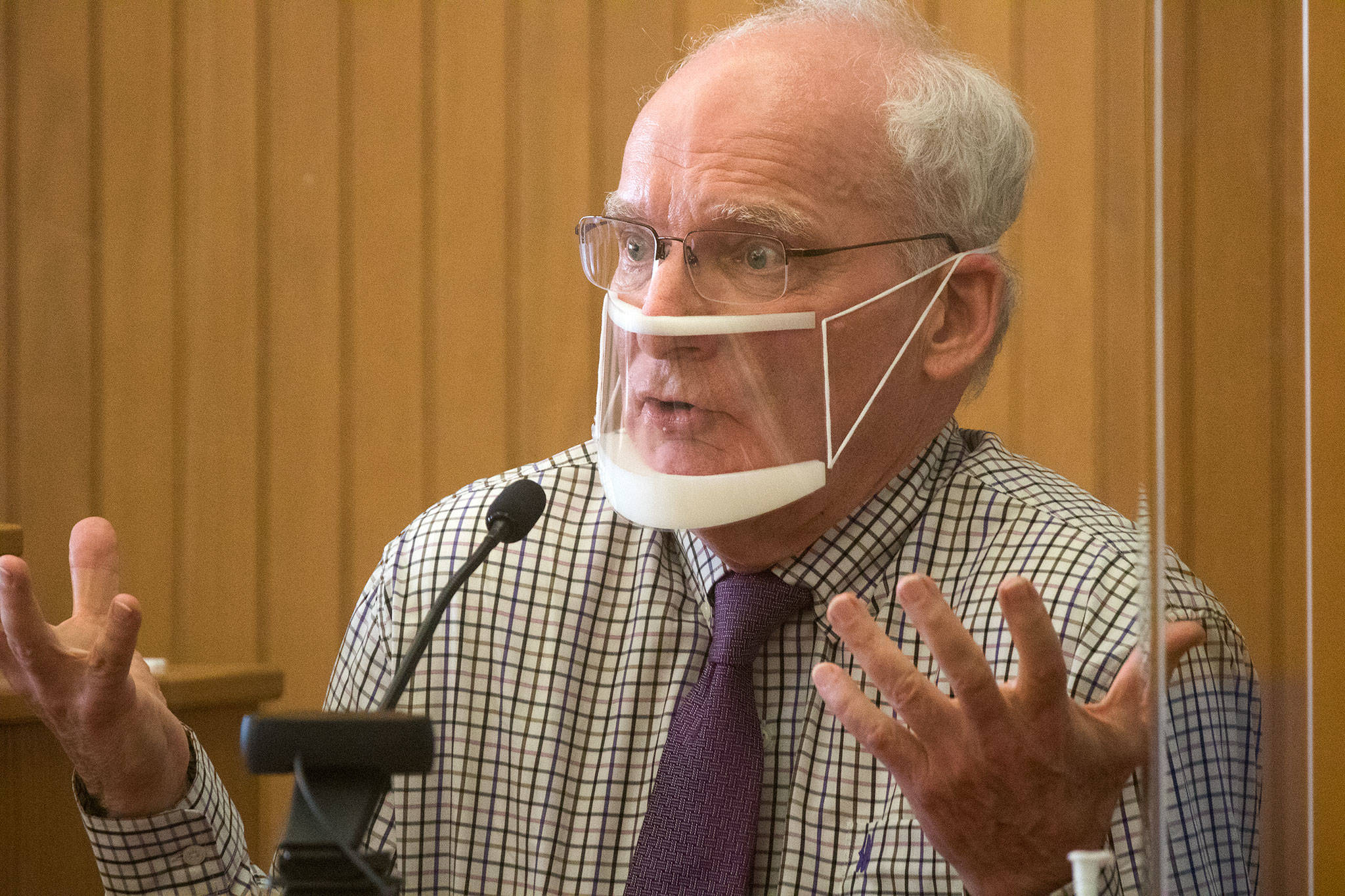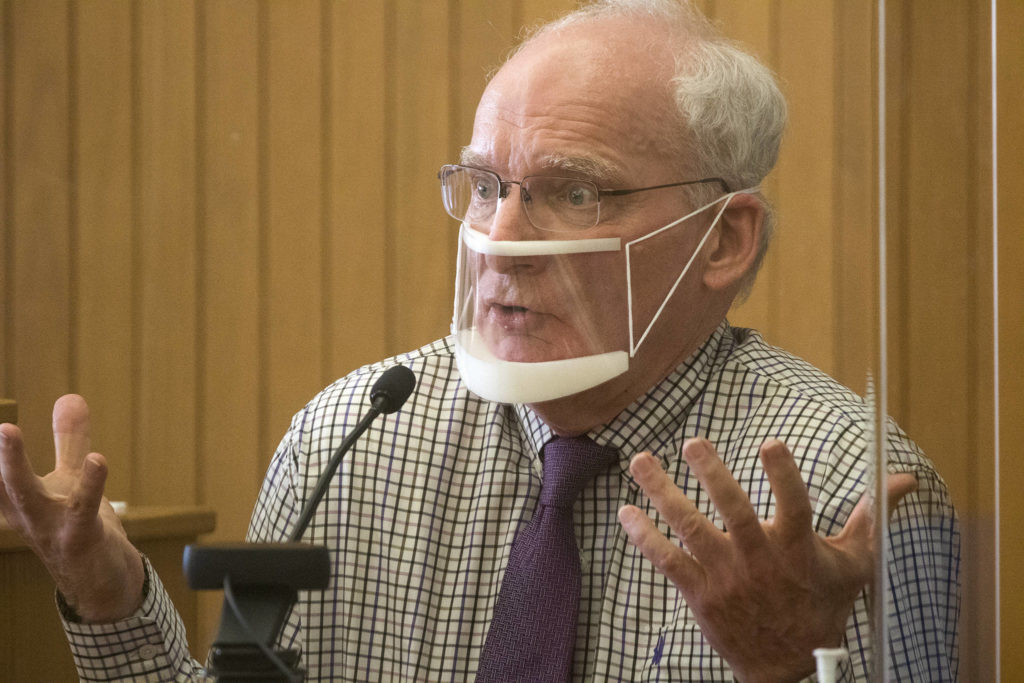EVERETT — Simeon Berkley approached another driver at the scene of a crash, pulled out a .380-caliber pistol and shot him in the head twice because he feared the other Everett man was reaching for a weapon, he told a jury Wednesday.
Steven Whitemarsh, 49, a Safeway manager and father of three, died with his seatbelt still fastened.
Berkley, 75, of Everett, has been on trial this month for second-degree murder. Thirty years earlier, a California jury acquitted him in another shooting that paralyzed a man following a near-crash in San Diego County.
Jurors heard closing arguments Wednesday in Snohomish County Superior Court.
As the final witness, the jury heard Berkley’s side of the story.
The driver of a gold Lincoln Navigator began tailgating Berkley’s Honda Accord around 7 p.m. July 6, 2019, on West Mukilteo Boulevard, the defendant testified.
“The closer he got, the more agitated (and) the more frightened I got,” Berkley said Tuesday under questioning from his attorney. “It was unnerving.”
He believed the other driver was chasing him. According to Berkley, at one point, Whitemarsh was so close to him that a piece of cardboard wouldn’t fit between his car and the much bigger SUV.
At a red light, Berkley said the stranger made eye contact with him while aggressively gesturing.
The light turned green. Berkley took a right onto Glenwood Avenue and sped up to about 75 mph to get away from the SUV, he told the courtroom.
As he drove east, he saw Whitemarsh gaining on him in his rearview mirror, so he hit the brakes to allow him to pass, he testified. Exactly how far he pulled over was in dispute. The SUV rear-ended the car in the 5200 block of Glenwood. Berkley testified he then got out of his Honda.
“When I got out of the car and looked toward him, he was laughing,” Berkley said.
During cross-examination Wednesday, deputy prosecutor Matt Hunter asked Berkley about the distances between the two cars as they drove up Glenwood. Berkley said he couldn’t remember because he was scared.
“Here’s the thing, Mr. Hunter: You didn’t see Steven Whitemarsh. I did,” Berkley said. “The reaction that I had to him was visceral, and I got a lot of adrenaline from looking at him.”
Berkley told the court that Whitemarsh didn’t make an explicit threat after the crash.
“You never saw a weapon?” Hunter asked.
“Nope,” Berkley said on the witness stand.
“He never said a word?”
“Nope.”
Earlier in the trial, police testified that Whitemarsh had a baseball bat wedged between the front seats of his car.
Berkley testified that he shot Whitemarsh because he appeared to be reaching for something with his right hand. With the way Whitemarsh had been acting, Berkley said he felt he didn’t have a choice.
An autopsy suggested Whitemarsh had his right hand up near his head at the time the first shot was fired, based on stippling gunshot wounds to his skin, according to testimony by Snohomish County Medical Examiner J. Matthew Lacy.
Berkley said he fired twice.
“I don’t have a justification for the second shot,” Berkley told the court Wednesday. “It all happened really fast. I’m still afraid of the guy, and it was just bang, bang.”
Defense attorney Laura Shaver told the the jury in her closing argument to consider that this case is about Berkley’s state of mind.
“This is the scariest thing that’s ever happened to Mr. Berkley,” she said. “It is important to remember what it feels like to be scared — the panic that you feel, the anxiety that you feel.”
Shaver acknowledged some jurors may believe Berkley’s actions were wrong, but that the law leaves room for that.
“He’s allowed to be wrong as long as, at the time, he, in good faith, does believe that his life is in danger, that he is going to suffer physical harm by Mr. Whitemarsh,” she said.
The deputy prosecutor countered that Berkley’s actions were not self-defense, because Whitemarsh didn’t pose an imminent danger to him after the crash. Hunter questioned whether Berkley was truly afraid of Whitemarsh. The deputy prosecutor noted Berkley hit his brakes, “bringing his greatest fear right to him,” and then walked back to the Lincoln to confront the driver.
“People get tailgated all the time,” Hunter said, “but they don’t shoot the tailgaters all the time, because that’s unreasonable.”
Twelve jurors will decide if Berkley’s actions amounted to murder or justifiable homicide. They deliberated for about 45 minutes Wednesday afternoon, with plans to resume Thursday morning.
Herald reporter Zachariah Bryan contributed to this report.
Ellen Dennis: 425-339-3486; edennis@heraldnet.com; Twitter: @reporterellen.
Talk to us
> Give us your news tips.
> Send us a letter to the editor.
> More Herald contact information.


























